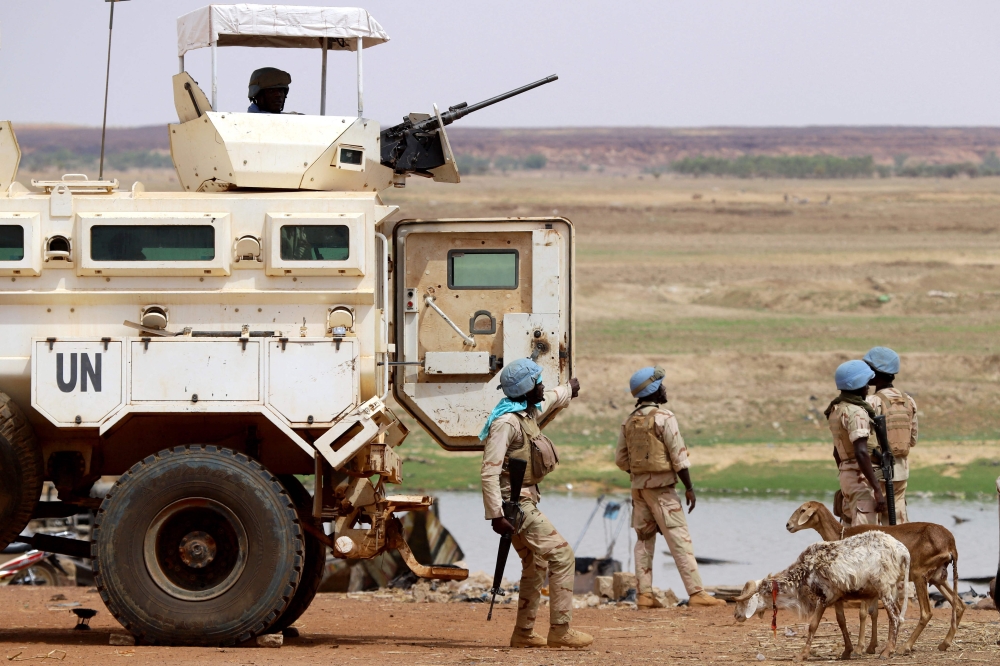
UNITED NATIONS, United States, June 30, 2023 (BSS/AFP) - The UN Security
Council on Friday ended a decade-old peacekeeping mission in Mali, whose
military junta has aligned with Russia and demanded the withdrawal of the
international force battling jihadists.
Bowing to the principle that peacekeepers need the consent of the host
government, the Security Council voted unanimously to start immediately winding
down the mission despite fears by Western powers of new instability in the
troubled nation.
The vote came two weeks after Malian Foreign Minister Abdoulaye Diop
stunned the Security Council by calling the UN operation known as Minusma a
"failure" and urging its immediate end.
Mali's relations with the United Nations have deteriorated sharply since a
2020 coup brought to power a military regime which also severed defense
cooperation with France, the former colonial power.
The junta instead has rallied behind Russia and brought in the Wagner
Group, the ruthless mercenaries involved in a mutiny against President Vladimir
Putin last week.
"We deeply regret the transitional government's decision to abandon Minusma
and the harm this will bring to the Malian people," senior US diplomat Jeffrey
DeLaurentis told the Security Council.
But he said that the United States voted for the resolution as it agreed
with the logistical timeline for the withdrawal, which is set to be complete by
the end of the year.
Russia's deputy ambassador to the UN, Anna Evstigneeva, said the
authorities in Bamako were seeking to take "full responsibility" for security
and that Russia "will continue to provide comprehensive support to Mali for
normalizing the situation."
Under the resolution led by France, the peacekeepers will cease their main
activity from Saturday and focus on a departure by the end of the year.
The peacekeepers will still be empowered to protect against "imminent
threats of violence to civilian" in areas surrounding them.
- Deadly and costly -
Minusma has been the most costly mission for the UN, at $1.2 billion a
year, and 174 peacekeepers have died since its creation in 2013.
Despite tensions with the junta, the UN mission had widely been expected to
be extended until the Malian foreign minister's intervention. Secretary-General
Antonio Guterres earlier in June had proposed renewing Minusma but streamlining
its activities.
In a report, Guterres acknowledged shortcomings but called the mission
"invaluable." He noted that several countries in the region saw extremist
groups as an "existential threat" whose violence could spill over and wanted to
strengthen Minusma.
With 13,000 troops and police in Minusma, its termination will be a
Herculean task with the United Nations needing to take away equipment,
helicopters and armored vehicles.
"Securing the constructive cooperation of the Malian authorities will be
essential to facilitate the process," said a spokesperson for UN peacekeeping
operations.
While the withdrawal was a given, the timeline was the focus of heated
negotiations in recent days, according to diplomats.
Mali, with the backing of veto-wielding Russia, had pushed for Minusma to
leave as quickly as possible, while some other nations feared that even six
months was too rushed.
Richard Gowan, an expert at the International Crisis Group, said that UN
officials feared that Wagner will simply take over Minusma facilities once the
mission is completed.
Julie Gregory of the Stimson Center said the end of the mission could have
a dire effect on civilians.
"It's likely that violent extremists will take the opportunity to increase
violence" with a potential for increased confrontation with national forces,
especially in the north," Gregory said.
Russia has insisted that its paramilitary forces will continue to operate
in Mali and other African nations, notably the Central African Republic,
despite the aborted mutiny of the Wagner Group's chief Yevgeny Prigozhin.
Russia had long insisted that Wagner was a private group but acknowledged
after the rebellion that it had been directly funding its overseas operations,
which have been widely criticized by the West and human rights groups.
"Ultimately it is for the Malian transitional authorities to choose its
partners," said James Kariuki, Britain's deputy ambassador to the United
Nations. "But let's be clear: the Wagner Group, whether operating autonomously
or under direct control from Moscow, is not the answer -- in Mali or anywhere
else."